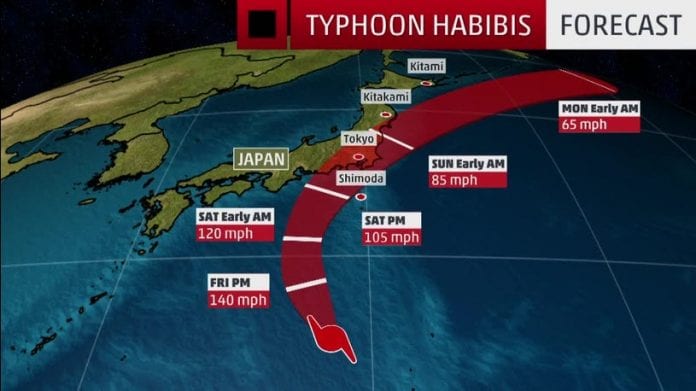Typhoon Hagibis – causing a ruckus for both rugby and Grand Prix fans
With Typhoon Hagibis causing havoc in Japan where both the rugby world cup and the Japanese Grand Prix are being hosted this weekend, many sports fans will disappointed that over 1,000 flights are now cancelled and leaving many out of pocket. The crucial match between Scotland and Japan has yet to be cancelled and fans will be biting their nails to see if the match takes place.
So what can you do if you’ve spent thousands on flights and tickets, only to have the game cancelled? Rebecca Kingsley, Brand Manager of travelinsuranceexplained.co.uk, details what you need to look out for in your policy wording to be covered:
What is force majeure cover?
Force majeure means a change occurrence or unavoidable accident. The term is used by travel insurers in relation to natural disasters or catastrophic events such as hurricanes, earthquakes and tsunamis. Force majeure is typically covered by most travel insurance policies.
How can I tell if my travel insurance policy provides cover for weather events like Hagibis?
Depending on the travel insurer, force majeure cover may also be referred to as natural disaster cover or catastrophic events. Most travel insurance will cover force majeure as standard; however, there are a few that will offer an add-on or extension.
Can I buy force majeure cover after I have purchased a travel insurance policy?
If you have brought your travel insurance policy and realised it does not include force majeure cover as standard you can contact the provider and, if they offer the cover, pay an additional premier to add it to the policy. However, you can only do this providing the natural disaster has not been announced or already taken place.
Will I get reimbursed for expenses, such as hotels, flights and loss of possessions, incurred as a result of Hagibis?
Although personal possessions, lost luggage and medical bills would be covered as standard, what people assume is that any accommodation or curtailment costs would also be automatically covered following a natural disaster. Travel insurance policies will only cover holidaymakers to move to a safer area if the natural disaster is a direct threat to the area they are in. Holidaymakers will not be covered to come home, unless it is medically necessary.
What should I do if I don’t have force majeure cover?
If you have booked your holiday through a tour operator or travel agent you should contact them directly to discuss your options. Those who have booked their flights and accommodation individually, and do not have force majeure cover, will be solely responsible for all costs related to alternative accommodation and transport.
Rebecca Kingsley from travelinsuranceexplained.co.uk said:
“People often assume travel insurance policies will cover them for every eventuality, but this is not the case, natural disasters or acts of God such as hurricanes and earthquakes are not always covered as standard and may need to be added to a policy.
Our advice is that everyone should look for a travel insurance policy that covers force majeure as standard, or one that allows you to purchase the cover to the policy. We would stress this particularly to people travelling to countries prone to natural disasters, this would ensure they are protected should the worst happen.”
Help keep news FREE for our readers
Supporting your local community newspaper/online news outlet is crucial now more than ever. If you believe in independent journalism, then consider making a valuable contribution by making a one-time or monthly donation. We operate in rural areas where providing unbiased news can be challenging. Read More About Supporting The West Wales Chronicle
























